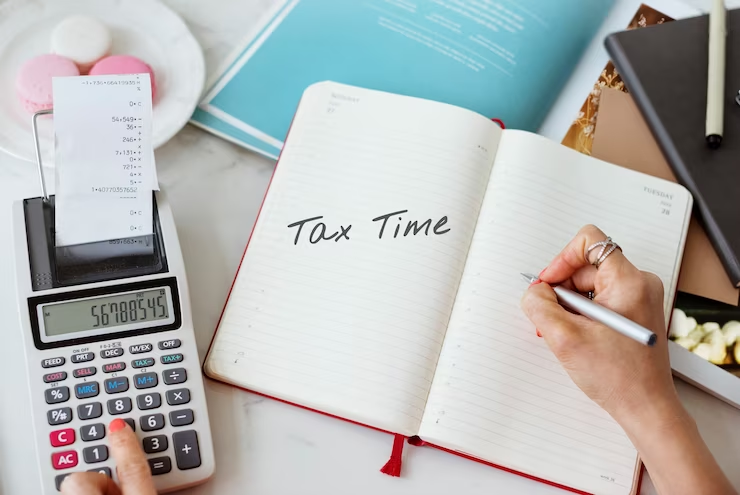Tax Season: Tips For Filing Your Taxes Like A Pro

Image Credit: Freepik
It is that time of year again - tax season!
That particular time of year when we all hunker down with our calculators and piles of receipts, trying to make sense of our personal finances. But do not worry, friends! Filing your taxes does not have to be a nightmare. You can tackle your taxes like a pro with some preparation and know-how.
A critical aspect of tax preparation that often gets overlooked is how to handle your credit card expenses. You might be wondering what credit cards do with filing your taxes. Well, as it turns out, your credit card spending can impact your taxes.
In this article, we will be sharing some tips and tricks to help you easily navigate tax season.
So sit back, relax, and let's get started on making tax season a breeze!
1. Get Organized

Image Credit: iStock
Getting organized is the first and most crucial step to filing taxes like a pro. You need to gather all your tax-related documents, such as
- T4 slips
- Receipts for expenses like charitable donations
- Medical expenses
- Education Expenses
- Any other documents related to your income or expenses
Create a dedicated folder or file on your computer to keep all your documents in one place, making it easier to find what you need when it is time to file.
As you collect your documents, review them for accuracy and completeness. If you are missing any documents, contact the relevant parties to obtain them.
Being organized will make the filing process more efficient and ensure you do not miss any essential tax incentives or credits that could save you money. You will be able to approach tax season confidently, knowing you have everything you need to file your taxes accurately and on time.
2. Know Your Deadlines

Image Credit: Freepik
One of the most important things to remember during tax season is the various deadlines that apply.
The following deadlines should be kept in mind:
● April 30th
This is the deadline for most Canadians to file their personal income tax return.
● June 15th
If you or your spouse is self-employed, you have until June 15th to file your return, although any taxes owing are still due April 30th.
● Quarterly deadlines
If you are self-employed, you may be required to make quarterly installments to the Canada Revenue Agency (CRA) throughout the year.
It is important to note that even if you do not owe any taxes, you still need to file them on time. Failing to meet the deadline can result in penalties and interest charges, which can add up quickly.
Mark the deadlines on your calendar, set reminders, or use tax software to keep track of important dates. Resultantly, you will have plenty of time to gather all the necessary documents and ensure that your tax return is filed accurately and on time.
3. Maximize Your Deductions
Maximizing your deductions is a crucial strategy for filing taxes like a pro. In Canada, there are many deductions and credits available to individuals, including:
● Charitable Donations
Keep track of your charitable donations throughout the year and claim them on your tax return. You can claim donations up to 75% of your net income.
● Medical Expenses
If you have significant medical expenses, you can claim them on your tax return. You can claim expenses for yourself, your spouse or common-law partner, and any dependents.
● RRSP Contributions
If you make contributions to a Registered Retirement Savings Plan (RRSP), you may be able to claim them as a deduction on your tax return.
● Childcare Expenses
If you have children under 16, you can claim child care expenses on your tax return.
● Home Office Expenses
If you work from home or run your own business, you may be able to claim certain expenses, such as office supplies and utilities, as a deduction on your tax return.
You can reduce the tax you owe and potentially increase your tax refund. Keep good yearly records to maximize your incentives, including receipts and other relevant documentation.
By taking the time to understand your deductions and credits and ensuring that you are claiming everything you are entitled to, you can file your taxes like a pro and potentially save yourself some money in the process.
Related: Practical Tax tips for Business Owners
4. Consider Hiring A Professional

Image Credit: Pexels
If you are not confident in your ability to file your taxes accurately, consider hiring a professional to help you. A tax professional can provide guidance on deductions and credits, ensure that your return is filed correctly, assist you in claiming tax refund, and help you avoid any financial mistakes that could lead to penalties or interest charges.
There are several options available, including a
- Tax Accountant
- Tax Lawyer
- Certified Tax Preparer
Before hiring a tax professional, make sure to do your research, read reviews, and compare fees. You must also ensure that the professional you choose understands Canadian tax laws and regulations.
Hiring a professional can provide peace of mind, save you time, avoid the tax scams, and potentially save you money by identifying deductions and credits you may have missed.
5. File Your Taxes Online

Image Credit: Freepik
Filing your taxes electronically is convenient, faster, and more accurate than filing a paper return. The Canada Revenue Agency (CRA) offers several options for filing your taxes electronically, including:
● Netfile
This service allows you to file your taxes online using tax preparation software. Most tax preparation software will automatically check your return for errors and omissions.
● EFILE
This service is available to tax professionals who file tax returns on behalf of their clients. If you are using a tax professional, ask them if they file electronically using EFILE.
● My Account
This service allows you to file your taxes using the CRA's website. You must create an account and have all your documents ready before you start.
Online filing can save you time and reduce the risk of errors, as the software can catch mistakes and provide guidance on deductions and credits. Additionally, online filing can result in a faster refund, as the CRA processes electronic returns faster than paper returns.
Keep your personal information secure when filing online by using a fast internet connection and choosing a solid password. If you are uncomfortable with online filing, consider using tax software to prepare your return and then printing and mailing it to the CRA.
6. Review Your Information Before Submitting

Image Credit: Freepik
It is essential to review your tax return before submitting it to ensure that all information is accurate and complete.
Here are a few tips:
- Check all your personal information, including your name, address, and social insurance number, to ensure it is correct.
- Review your income and deductions carefully to ensure they are accurate and complete.
- Double-check any calculations or figures to ensure that they are right.
- Check that you have claimed all the deductions and credits that you are eligible for.
- Ensure that you have signed and dated your return before submitting it.
- If you are filing electronically, review your return for any errors or warnings the software provides.
Even small mistakes can result in penalties or interest charges, so it is worth ensuring that everything is correct.
If unsure, do not hesitate to contact a tax professional or the CRA for guidance. Reviewing your information before submitting it can help ensure your return is filed accurately and on time.
7. Be Prepared For Audits

Image Credit: iStock
While no one wants to think about being audited, it is imperative to be prepared just in case. The CRA can select tax returns for review to ensure that all information is accurate and taxpayers have claimed all the deductions and credits they are entitled to.
To be prepared, keep all your tax-related documents and receipts for at least six years. If you claim expenses like home office expenses, keep detailed records to support your claims.
If you do receive a notice of assessment or audit, do not panic. Review the notice carefully and gather any additional information or documentation requested by the CRA.
If you are unsure about something, consider seeking guidance from a tax professional. If you do preparation and keep accurate records, you can help make the audit process go as smoothly as possible.
How Can Credit Card Spending Impact Your Taxes?
The way you use your credit card can have an impact on your taxes. For example, using your credit card to make business-related purchases can deduct those expenses from your tax return. However, keeping accurate records and receipts to support your claims is essential.
On the other hand, if you carry a balance on your credit card and accrue interest charges, those charges are not tax-deductible. Additionally, those amounts may be taxable as income if you receive rewards or cashback for using your credit card.
Further, if you have a secured credit card, using it responsibly and paying off your balance on time can help you build or rebuild your credit score, which can positively impact your overall financial well-being.
Also, read How To Get A Secured Credit Card In Canada.
Understanding the tax implications of your credit card spending is essential to make informed decisions and avoid surprises when it comes time to file your taxes. As always, consult a tax professional if unsure how your credit card spending may impact your taxes.
Conclusion
Well, folks, that is a wrap on our tax season tips! We hope you found these suggestions helpful as you navigate through filing your taxes like a pro.
Remember, tax season does not have to be a stressful time of year. With some preparation and a little effort, you can breeze through your taxes and potentially save some money in the process.
Filing your taxes is just one part of your financial health. Do not forget to consider your long-term goals and how you can set yourself up for financial success. Maybe that means starting a retirement account or saving for a down payment on a house. Whatever your goals may be, take action and start making progress today.
Thanks for tuning in, and happy filing!


